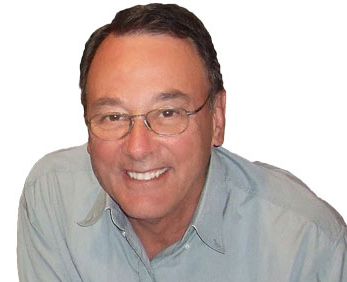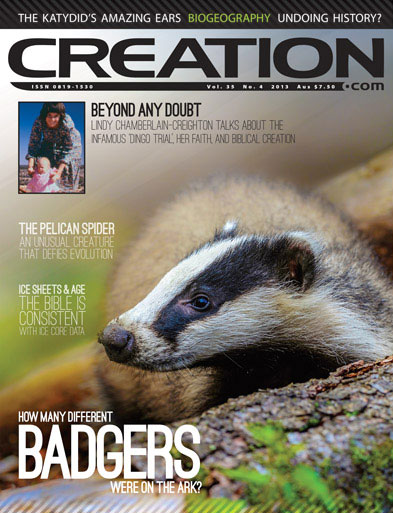Blinded by evolutionary brainwashing
Warren Nunn and David Catchpoole chat with retired Ph.D. biochemist and medical researcher Dr Ainsley Chalmers

Dr Ainsley Chalmers has a B.Sc. from the University of Adelaide, South Australia majoring in two chemistries and a Masters qualifying exam and Ph.D. from Flinders University, Adelaide, South Australia. For the Ph.D., he studied the mechanism of action of thiopurine immunosuppressants used in human transplantation. He conducted cancer research at the University of Queensland, Brisbane, Australia and later returned to Adelaide where he became Principal Hospital Scientist at Flinders Medical Centre. His research has been widely published in secular peer-reviewed publications.
Dr Chalmers feared the speaker would be tarred and feathered as he presented evidence contradicting evolution to a hostile audience.
Apart from a few listeners, the overwhelming majority were committed evolutionists, entrenched in their understanding of all things scientific and how that played out in their field; the whole creation idea was just a myth.
As Dr Chalmers settled in to listen to the creation speaker1 at Flinders Medical Centre that day, he was sympathetic to the message but not prepared for the impact it would have on his life.
He considered himself already a believer in Christ but had set aside too-hard questions as the decades rolled by and his career blossomed. He had buried himself in research, taken up prestigious jobs and achieved much.
It was 1991 and the audience of more than 400 was at the so-called Hospital Grand Round, full of both junior and senior medical staff, lecturers, professors and more. As the presentation went on, it was as if the creation speaker was talking directly to him and reading his mind, particularly when he explained that Adam and Eve were created mutation-free and lived hundreds of years.
As the implication of that set in, he was shell-shocked. “The answer [to the Cain’s wife ‘dilemma’] had been staring at me in the face for years but evolutionary brainwashing had somehow blinded me,” Dr Chalmers said.
“I had known for years that mutations cause ageing/diseases and intermarrying close relatives would result in alleles mutated at the same site and problems arising there from.”

He began to realize also that the fact that humans are still here, with such a high rate of mutational degeneration, is actually powerful evidence for the Bible’s 6,000-year timeline of human history. There have been only about 200 or so generations since our ancestors Adam and Eve were created with their “very good” physical bodies (Genesis 1:31). And the genomic decline is also consistent with the decrease in longevity after the catastrophic population bottleneck at the Flood.
But Dr Chalmers had to wrestle with deeper questions regarding evolution. He had long accepted the ‘reality’ of molecules turning into microbes; then mice, monkeys, and man under the direction of mutation and natural selection.
His mind raced through the implications of natural selection. He pondered the likelihood of a huge gain (1,000-fold) of genetic material from a microbe (4 million base pairs) to man (3 billion) and concluded biology just doesn’t work that way.
“Genes tend to mutate/degrade with time, not get better,” he said. “Mutations, even small ones, are very rarely, if ever, really beneficial and even when they are, they generally either involve loss of function and/or are in some way a corruption of information. For example, a mutation that breaks down the efficiency of molecular pumps for a bacterium to draw nutrients from its environment means that it will better survive certain antibiotics. But it is a damaged bacterium, so when the antibiotic is removed, it will be less able to cope than its non-resistant fellows. Sure, one can put an insulin gene into a microbe and get it making lots of insulin but it will still be a microbe. No amount of detailed genetic manipulation in the laboratory will turn a microbe into a worm or a fly. So it certainly won’t happen spontaneously even over millions of years. And natural selection won’t change that. We can see it happening, but the effects are trivial compared to this downhill tendency in our DNA. So, to me, evolution or Darwinism just can’t happen.”
The creation presentation came at a pivotal time in Dr Chalmers’ life, a few years after his much-loved wife Denise died of a malignant melanoma. Denise was a devout believer and it was her beautiful relationship with Christ that Dr Chalmers said held their marriage together as they raised their three daughters.
Dr Chalmers tends to gloss over his influence on the Australian scientific community, but his lifetime of achievements includes teaching medical biochemistry to years 1–2 medical students; senior lecturer status in the School of Medicine; research in biochemical mechanisms of disease processes, genetic testing for inherited cancers and analytical method development. He was a NATA2 assessor and a member of the Australasian Association of Clinical Biochemistry and Australasian Free Radical Society. And both at Flinders University and Griffith University, several of his students successfully completed both Honours and Masters degree programs under his supervision. In retirement, he continues to co-supervise (pro bono).
After gaining his Ph.D. in 1971, there followed a post-doctoral fellowship at the University of Queensland for two years and, in 1973, it was back to Adelaide as a Hospital Scientist at the Institute of Medical and Veterinary Science. Dr Chalmers helped run a Chemical Pathology lab and did research into the cause of toxicity associated with parenteral3 xylitol4 administration.
In 1975, he was offered a Senior Hospital Scientist position in the then new Flinders Medical Centre where he was involved in setting up and running a Chemical Pathology Lab, doing research as well as helping teach the first batch of medical students.
All the time, as Dr Chalmers was focused on his daily high-level responsibilities and research tasks at hand, he steadfastly professed Christ, yet at the same time admits to being a theistic evolutionist.
“Looking back now, I can see my thinking was absolutely divided. But, at the time, I was comfortable with the notion that ‘God [somehow] used evolution’.”
In hindsight, it was inevitable that Dr Chalmers would embrace Young Earth (biblical) Creationism but that did not happen overnight.5
From the moment in the early 1990s when the creation presentation set Dr Chalmers on a different kind of research endeavour, several years elapsed, retirement came along and Ainsley the man—not just the esteemed scientist filled with decades of human knowledge—finally accepted the truth of Genesis.
The evidence of God screamed out from the work he did as he looked at the incredible biochemical harmony in a single cell, 1/100 mm in diameter.
“There are about 25,000 genes and about 50,000 proteins in this tiny cell working in incredible biochemical harmony to keep us alive,” Dr Chalmers said.
“When one considers that we were once a fertilized ovum 1/10 mm in diameter (the size of a talcum powder particle) and this cell gave rise to 20–30 trillion other cells like liver, brain, bone, skin, spleen, eye, etc. to make us, it boggles the mind.
“Comparing one of our cells to a 747 jet is like comparing the world’s largest super computer with a safety pin. The 747 has an army of designers so isn’t it logical for cells to have a designer called God? The Bible calls our creator Jesus Christ. The whole of creation from the huge universe to our tiny cells cries out the existence of our creator God.”
It was the case, as he discovered others had observed,6,7 that accumulating mutations mean that genetically we’re going downhill with every passing generation.8,9
Another clinching thought was the importance of all people being related10 because, without it, how could Jesus Christ be our kinsman-redeemer?11
Dr Chalmers says his interaction with committed evolutionists brings challenging discussions as well as opportunities to share the reality of Genesis.
“People get sucked in by science because of the success they see with experimental science. Historical science is, however, completely different and not something you can hang your hat on.
“The atheistic Ph.D. scientists I worked with challenged me to show them God. I told them to look in the mirror and ask who made your eyes to see, ears to hear, mouth to talk, brain to reason. Their response—evolution. One professor just called me a Jesus freak. I am proud of that title.”
These days Dr Chalmers also goes to churches to share his creation testimony. “I really feel that I am doing God’s work despite my lack of knowledge in certain areas. Most folk seem to be quite receptive and are surprised to hear a research scientist speak against evolution,’’ he said.
References and notes
- Then still a medical doctor, later fulltime with the ministry that was to become CMI. Return to text.
- National Association of Testing Authorities, Australia. Return to text.
- I.e. bypassing the mouth and digestive system, e.g. intravenous drip. Return to text.
- A type of sugar alcohol used as a low-calorie sweetener that is good for teeth. Return to text.
- Given the dramatic re-thinking required to change to a biblical worldview, it’s not surprising that many people do indeed need time to mull over the issues. See creation.com/time-to-think, creation.com/can-christians-believe-evolution. Return to text.
- Sanford, J., Genetic Entropy and the Mystery of the Genome, 3rd edition, FMS Publications, New York, 2008. (See review by Truman, R., J. Creation 21(1):43–47, 2007; creation.com/sanford-review.) Return to text.
- Plant geneticist: ‘Darwinian evolution is impossible’—Don Batten chats with plant geneticist John Sanford, Creation 30(4):45–47, 2008; creation.com/sanford. Return to text.
- In some places genetic disorders have become so evident in offspring that authorities have stepped in to prohibit inter-cousin marriages, Creation 30(1):54–55, 2007; creation.com/you-shouldnt-marry-your-cousin. Return to text.
- Catchpoole, D., Time—no friend of evolution, Creation 34(3):30–31, 2012. Return to text.
- Wieland, C., One Human Family, Creation Book Publishers, Atlanta, 2011. Return to text.
- Sarfati, D., The Incarnation: Why did God become Man?, Creation 35(1):34–37, 2013; creation.com/incarnation. Return to text.







Readers’ comments
Comments are automatically closed 14 days after publication.